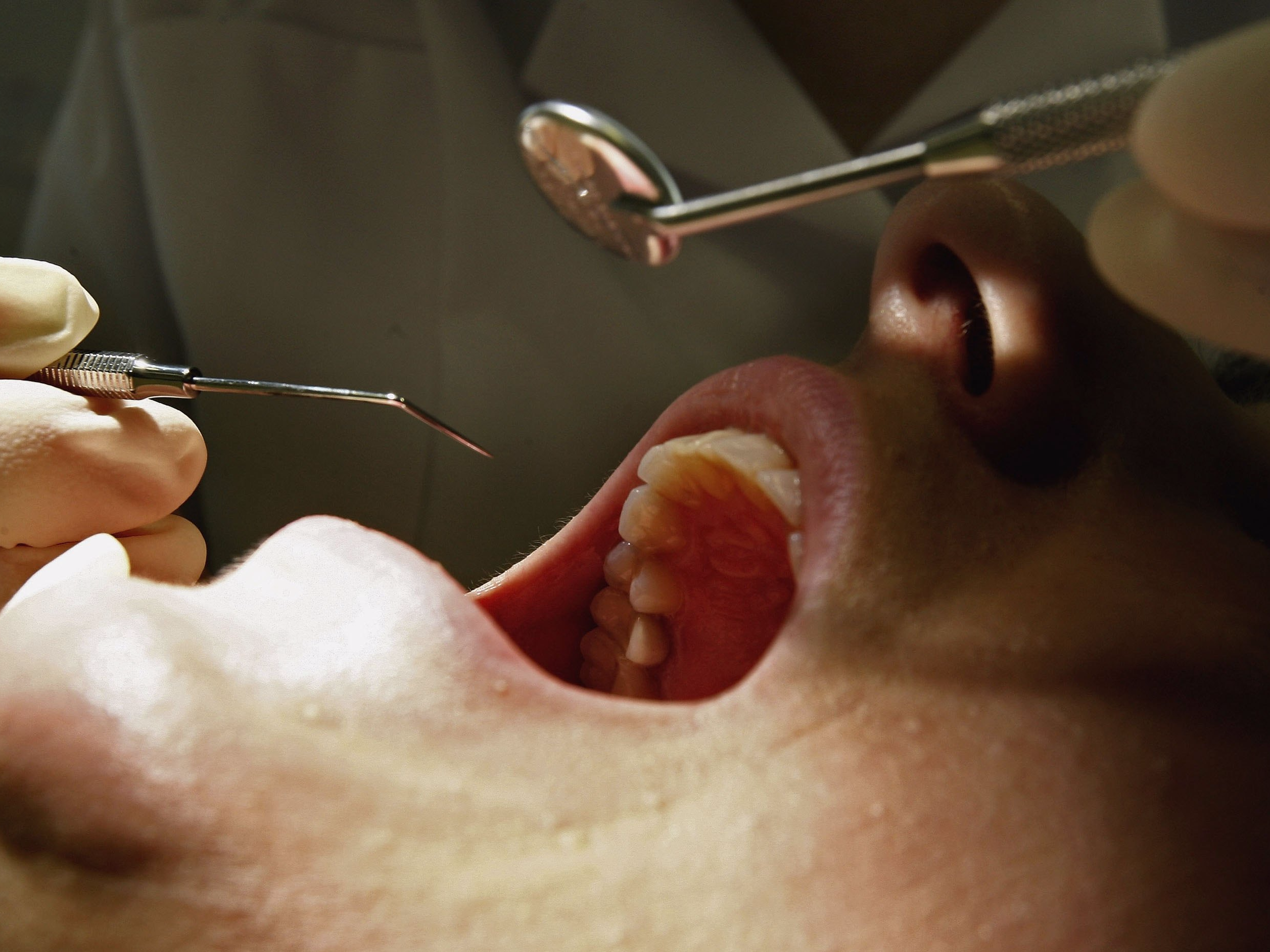- The signs of dental decay, gum disease, or cavities are not always obvious.
- Bad breath and bleeding gums can both be signs of gum disease.
- If you notice white patches on your teeth or a tooth getting darker over time, consider seeing a dentist as you might have cavities or dental trauma.
Everyone wants a healthy smile, but it’s not always easy to tell when your teeth are struggling. Dental decay, gum disease, and cavities can announce themselves in some pretty sneaky ways.
INSIDER consulted with dental experts to uncover the signs that your teeth aren’t as healthy as you think they are.
You have bad breath all the time
Though it’s normal to experience bouts of bad breath once in a while, persistently bad breath might mean something is amiss in your mouth.
“Bad breath or ‘halitosis‘ can be a warning sign of gum disease. Improper brushing and flossing can lead to a buildup of plaque and bacteria on the teeth and gums causing inflammation and bleeding of the gums,” cosmetic and restorative dentist Kimberly Harper told INSIDER.
Bad breath can also be caused by sinus issues or even stomach problems, so it's worth a trip to the dentist if you notice your bad breath isn't going away.
Your tongue looks white Foto: A healthy tongue should be light pink.sourceFrazer Harrison/Getty Images
Foto: A healthy tongue should be light pink.sourceFrazer Harrison/Getty Images
Your tongue can turn many different colors depending on what you've recently eaten but if you notice that your tongue usually looks white and coated, your mouth might not be as healthy as you think.
"Many people forget to brush their tongue while brushing their teeth. A white coating develops from an accumulation of bacteria. This leads to bad breath and an overall unhealthy dentition," orthodontist Bobbi Peterson told INSIDER.
Keep bacteria at bay by giving your tongue a quick scrub with your toothbrush or the ribbed back of your brush head. Keeping up with brushing and flossing is also a good way to decrease the harmful bacteria in your mouth.
Read more: 5 warning signs your tongue could be sending about your overall health
Food is always getting stuck between your teeth
If you find yourself frequently fishing food out of your smile, it might be a symptom of a growing cavity.
"If you're flossing and brushing like normal but feel that there's always food stuck between your teeth, this could be a sign of a hidden cavity between teeth that you can't see from the surface," dentist Teresa Li told INSIDER.
If you suspect that food might be catching on a hidden cavity, be sure to bring it up with your dentist so that they can take a look between your teeth. It's also a good idea to keep up with regular flossing to keep any small cavities from growing larger.
Your gums bleed when you brush or floss

If you've been noticing a bit of blood in your toothbrush or saliva after brushing or flossing, it could be a sign that your gums are in distress.
"Inflamed gums bleed upon a light touch, even with a toothbrush. Healthy gums do not bleed upon a light touch. If you see pink in the sink after brushing your teeth may not be as healthy as you think," dentist Lee Gause told INSIDER.
Redness and swelling are also signs of gum disease or inflammation. Head to the dentist if your gums are painful or you notice bleeding without an obvious cause.
You have white patches on your teeth
White patches on your teeth could be one of the first indicators of an impending cavity.
"White spots could indicate early tooth decay with porosity and weakening of the enamel," said Dr. Li.
Tooth decay is often in areas that you can't see, like the back of teeth or between teeth, so it's hard to spot with the naked eye. That's why scheduling regular dental appointments is so important.
You've noticed one tooth getting darker over time
Sometimes dental problems can be seen rather than felt. When one tooth starts to look darker than surrounding teeth, it might indicate a nerve problem.
"If a tooth is struck, often in an athletic trauma, the nerve inside the tooth cannot sustain the blow. This tooth can become necrotic and can darken over the years relative to its neighbor," explained Dr. Gause.
This condition often occurs in front teeth. If you notice one tooth darkening, you should definitely consult a dentist even if the tooth doesn't hurt. Not doing so can result in the loss of the tooth.
You have lingering discomfort
With healthy teeth, you should not experience discomfort when brushing, flossing, or chewing. Pain when biting or eating can indicate you've sustained a temporary tooth injury or more serious damage.
"Sometimes you can have a 'bruised tooth.' For example, if you bite into a pebble in a salad unexpectedly, the tooth can become tender for a few days. Like any bruise in your body, this eventually heals," dentist Jason Hui told INSIDER.
Dr. Hui said, however, that any tooth pain that does not go away after a week could be a sign of a serious issue, such as a cracked tooth, which might require restorative dentistry.
Your teeth are sensitive to hot or cold drinks

Sensitivity to hot or cold foods and beverages can be a sign that a cavity is brewing in your teeth. Healthy teeth usually aren't too sensitive to extreme temperatures, but ailing teeth might hurt or ache after you take a sip of hot tea or enjoy a bowl of ice cream.
"Often, the length of time the teeth hurt are an indication of how severe the problem may be. Do not be alarmed if it hurts just for a second because sometimes cold drinks tend to trigger a bit of sensitivity for just a brief second. You know you may be having a problem if the sensitivity to cold or hot lasts longer and longer," Jeffrey Sulitzer, dentist and chief clinical officer at Smile Direct Club, told INSIDER.
Sensitivity to hot and cold might also indicate that you have an uneven bite that is causing some teeth to wear down faster than others. Talk to your dentist about any sensitivity you might be experiencing.
You notice you have a tense jaw when you wake up
If you frequently wake up with a sore jaw or a slight headache, jaw clenching or tooth grinding might be the culprit. Many people grind their teeth at night or clench their jaw during stressful moments.
"Tooth grinding or clenching can cause teeth to become sensitive to hot, cold, or even just pressure. Often patients are very aware that they have this problem because they catch themselves clenching or grinding during stressful situations," said Dr. Sulitzer.
Sometimes grinding or clenching can translate into temporomandibular joint dysfunction or TMJ. This condition can have lasting consequences for your jaw.
"Grinding of teeth can negatively impact the jaw joint, which is a similar type joint as the elbow or knee. It can click or pop out of socket if it gets unhealthy," said Dr. Gause.
A night guard made by a dentist can greatly decrease the damage that occurs to teeth and jaw from nocturnal grinding.
Your teeth seem to be getting longer or bigger
Teeth can sometimes appear to grow longer or wider and this is often a sign of gum disease or damage.
"Your gums may be gradually receding due to gum disease, but as this is a progressive disease, you might not notice at first. As your tooth roots become more exposed, you not only get that 'long in the tooth' look but start to feel sensitivity and pain," explained Dr. Li.
Another culprit is toothbrush abrasion. Heavy-handed use of a hard toothbrush can cause the gums to recede over time.

